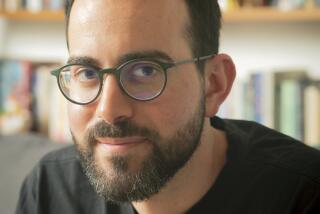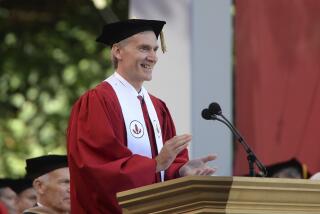In Science, Trying May Be Better Than Succeeding
- Share via
During lunch last month, a Nobel Prize-winning president of a prestigious university revealed that the school often awarded tenure to scientists who studied esoteric, impractical things over those who had achieved real-world advances.
I asked him why. What makes coming up with an equation to describe a black hole more important than the discovery of a treatment for a lethal disease?
He barely hesitated before answering: “It’s harder.”
It is, in fact, the pursuit itself, rather than any practical result it may yield, that is the lifeblood of true science, he suggested.
It struck me that he was telling me something that is common knowledge to scientists but is counterintuitive to the rest of us, especially journalists, who are constantly asked by editors to tell the reader why a story is “important.”
The Nobel laureate’s answer came crashing back to me two weeks later at the Jet Propulsion Laboratory in Pasadena.
Sitting in the newsroom at JPL near midnight, I witnessed an uncomfortable clash of cultures. Actually I was part of it. Trapped in a mixed group of journalists and rocket scientists, I waited tensely with the others for the final real attempt to contact the Mars Polar Lander, lost somewhere on its descent to the martian surface.
It was like a mad, midnight funeral, for we all suspected that the spindly spacecraft had died and that this last try to get the lander to phone home was just a formality. By this time--after four exhausting days of failed communication attempts--the psychological and physical lines of separation had faded and a few scientists loitered with the reporters and bantered casually.
Then, suddenly, the newsroom television sets were switched from the solemn NASA channel to Jay Leno, who was just beginning a viciously funny monologue on the Polar Lander’s fate.
First, the familiar three tones of a failed phone connection, followed by an operator’s voice saying: “I’m sorry, the party you are calling is outside the subscription area and is unable to answer.”
Then Leno held up a hardcover book titled: “Men Are From Mars, Women Are From Venus. Where the Hell Is the Polar Lander?”
Finally, Leno announced a new NASA game show: “How to Lose $165 million.”
The newsroom TVs blared the merciless monologue at high volume as the stereotypically insensitive reporters laughed just as loudly. I glanced around the room and noted that while some NASA people were clearly not amused, a few had joined the journalists and laughed heartily. Some of these scientists had invested years in the ill-fated spacecraft. For one of them, this would be his fourth lost space mission.
Watching them, I thought: Either these people are punchy or they truly are special, able to place the loss of the Polar Lander in perspective and laugh at themselves.
Then I thought of my recent lunch and wondered if, to these few space scientists, the pursuit of a landing near the martian south pole was more important than actually accomplishing that feat.
These were not the basic researchers my lunch companion was referring to, tracking some elusive atom in a nuclear collision that nobody will ever see. They were explorers sending a real piece of hardware to the Red Planet while the whole world watched and waited . . . and ultimately saw them fail.
Logically, they should be disappointed, and I’m sure they were. But is it also possible that the landing failure somehow legitimized the difficulty of what they were trying to do?
If landing on Mars were that easy, wouldn’t we have done it more than three times in the last 23 years? And won’t the loss of the Polar Lander allow these scientists to go back and dedicate themselves to trying it again? In contrast, after a successful mission, aren’t the scientists involved left with an empty feeling, wondering what they do next?
This may be mere rationalization and completely off-base. But on the other hand, if you, the reader, don’t understand my reasoning, then I might just conclude that what I’ve tried to do here is really hard and, hence, the end result is not nearly as important as my attempt to write it.
This could qualify me to be the first tenured journalist in history.






